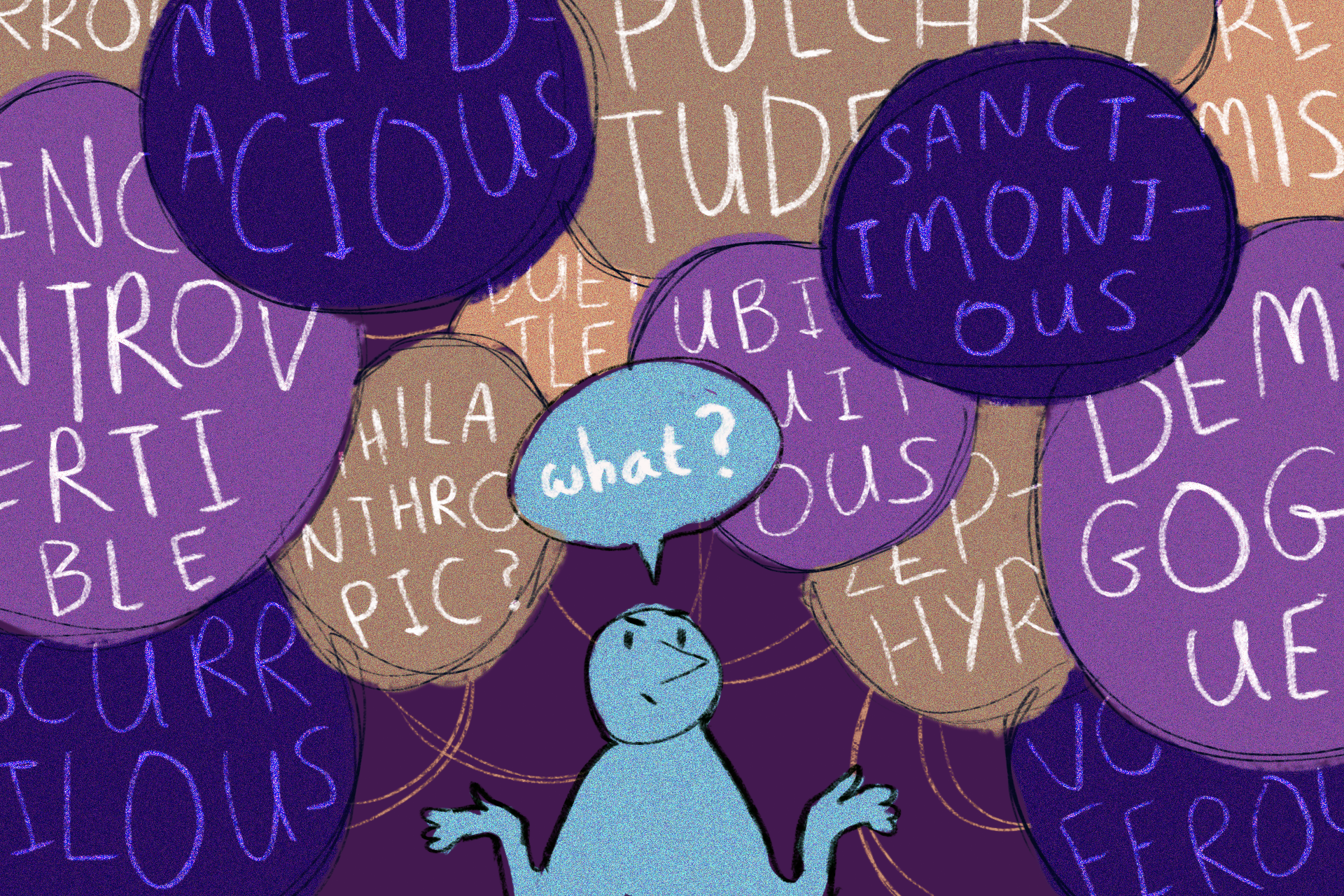OPINION | OP-EDS
Addressing Misrepresentation
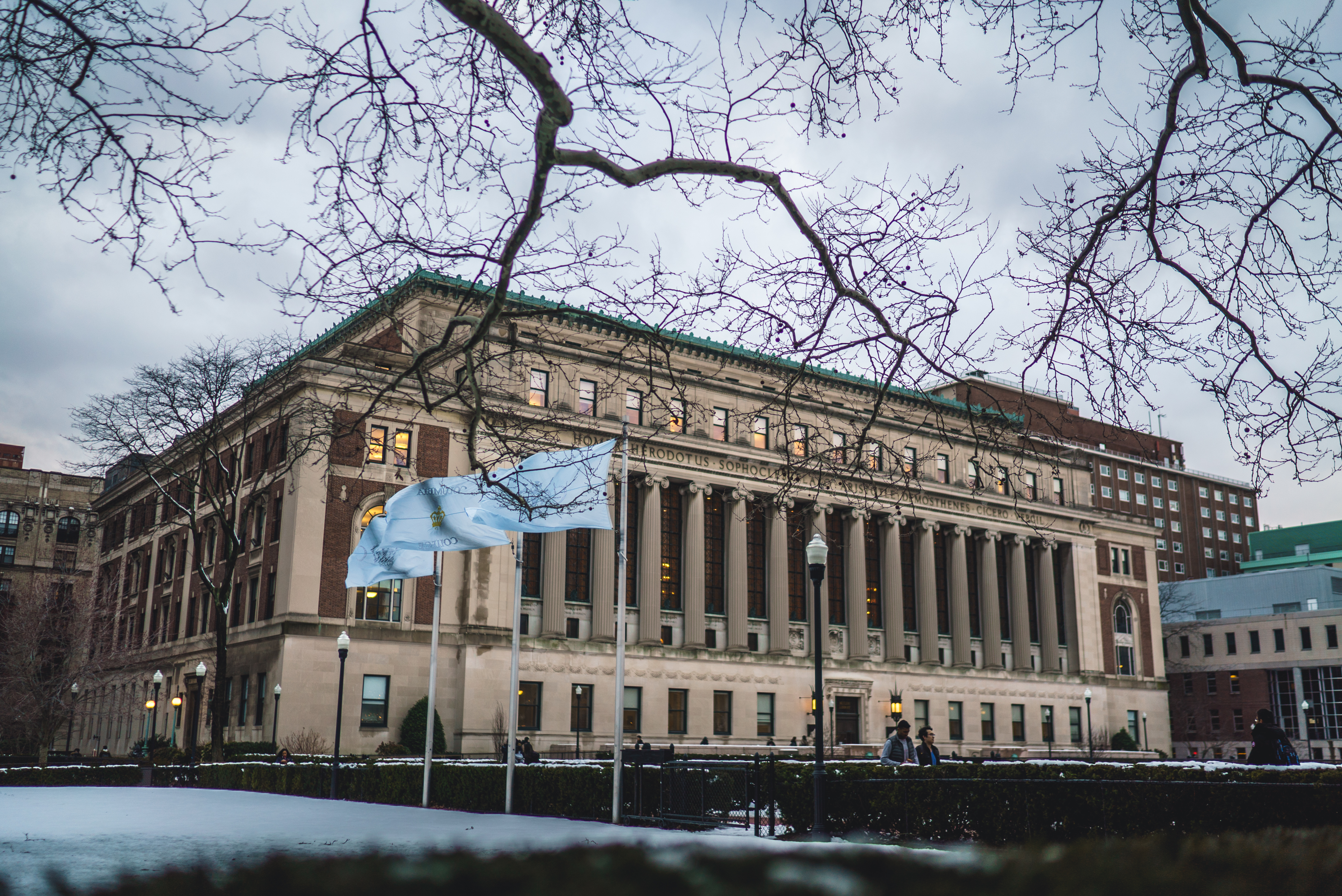
Ha Quoc Huy / Columbia Daily Spectator
This is not the representation I asked for
“Columbia students pride themselves on being politically active, yet there was a period of time when dozens of Columbia Crushes posts fetishized different ethnicities and races. … The less we talk about the ways in which our bodies are fetishized, the less people will recognize it as an issue, and the more people, including our classmates, will continue to fetishize our bodies.”
Victoria Hou is a first-year in Columbia College. She deleted Tinder because too many guys kept on sending her shitty racist pickup lines. When she’s not criticizing music, she enjoys pretending to study in Ref when she’s really just posting memes on buy sell.
I am not your token negro
“Contrary to popular belief, minority students do not exist on this campus to simply explain intersectionality to those who don’t understand, analyze a Toni Morrison quote for them, or stroke their white savior ego. We have passions, frustrations, and voices that deserve to be acknowledged and addressed.”
Heven Haile is a first-year in Columbia College studying political science and African-American history. She is a first-year representative for the Black Students’ Organization and a member of the Ethiopian Eritrean Student Association.
First-generation low-income’ is not just your monolith
“My identity is not your stepping stone toward an elected position. There is an overwhelming problem of trivializing the FGLI identity at Columbia. It is easy to ignore that identity when the norm here is being upper middle class and conversations center around the assumption that most students have had similar experiences. As an FGLI student, I am constantly erased. I am implicitly told to be satisfied with what I am given because it is so much more than I ever had before coming to this school.”
Cat Marie Sposato is a first-year at Columbia College, studying political science. She is interested in musical theater and volunteering. She is a Columbia cheerleader, a first-year representative on the First-Generation Advisory Board, and a member of Alianza, PorColombia, and FLIP. Follow her on twitter at @CatMarieLive and on Instagram at @KeepUpWithCat
Accountability of Student Groups
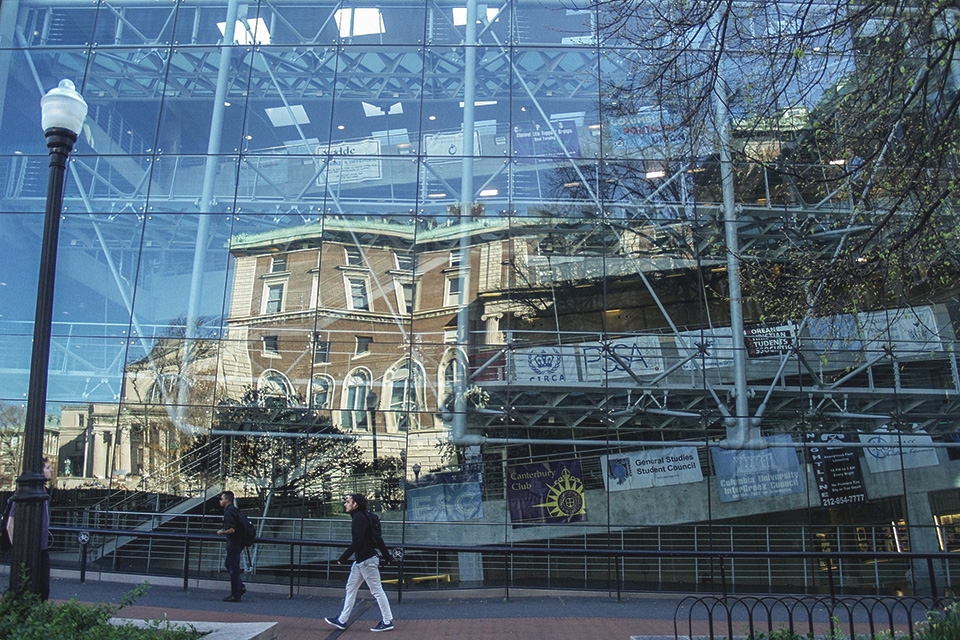
Madeline Molot / Staff Photographer
Why I left my frat
“The frat brothers’ unwillingness to do anything seemed to reflect fears of grappling with the organization’s own position in conversations about gender-based misconduct on campus, as well as a simple lack of care for those in the Columbia community that were not their white frat brothers.”
Shaquan Nelson is a junior in SEAS studying computer science.
Rape culture and Columbia’s whisper networks
“Whisper networks function to fill in the gaps. They are protective and preventive, informal Band-Aids on a much larger systemic issue. And, I imagine, they have probably saved lives.”
Juliana Kaplan is a junior at Barnard College studying English. She is a former associate Spectrum editor for Spectator. She is currently studying abroad in London.
CUCR and the privilege of unaccountability
“While minority students are held unjustifiably responsible for the actions of others, how can CUCR actively do harm and expect to remain innocent? How can a group of people on this campus take an active role in inviting ideologically and physically violent speakers and expect to bear no culpability?”
Toqa Badran is a junior in Columbia College studying political science with a double concentration in anthropology and Middle Eastern, South Asian, and African studies. She is the student services representative for CCSC.
The price of “free speech”
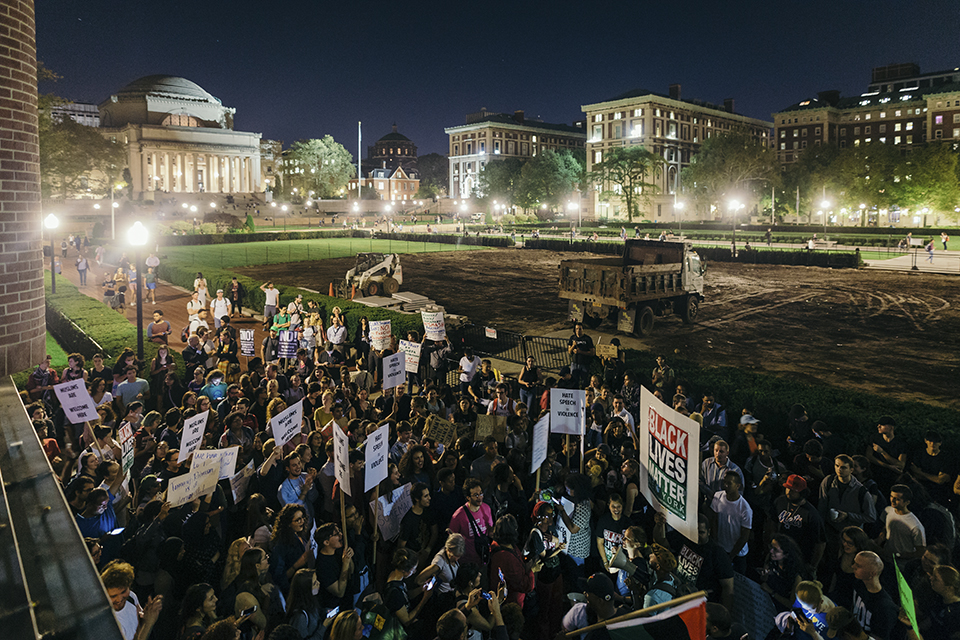
Jaime Danies / Senior Staff Photographer
From the Party of Lincoln to the Party of Pizzagate
“CUCR reflects what Charlie Sykes, who spent decades hosting an archconservative talk show in Wisconsin, says about the Trump-era Republican Party: It is ‘a party dedicated to liberal tears,” not “a movement based on ideas or centered on principles.’”
Ben LaZebnik is a Columbia College senior majoring in urban studies. He is a former lead activist with Columbia University College Democrats. He has also been a part of several political campaigns and causes both at Columbia and in his hometown of Los Angeles.
The First Amendment should not only be for those that we agree with
“I know why students were present and protesting. Of course I do. Tommy Robinson offends and threatens many black and brown bodies with his rhetoric. But if you don’t understand how someone begins to think like this, you will never understand how to stop it and how to make sure political parties do not arise out of such rhetoric.”
Allison Talker is a junior in Columbia College studying political science. She is a board member for Women in Law and Politics and will be applying to law school next year.
Is CUCR afraid of free speech?
“Yet will CUCR defend Drexel University Professor George Ciccariello-Maher’s right to freedom of speech or the right of his students to a critical education? Would they invite him to Columbia so that they can fulfil their stated goal of hearing different viewpoints? If Ciccariello-Maher is eventually fired, I can only assume that an emboldened ‘alt-right’ will soon turn its sights on outspoken Columbia University professors as well.”
Jared Brandon Sacks is a doctoral candidate in the department of Middle Eastern, South Asian, and African studies at Columbia University. He previously worked as an investigative journalist and political analyst in South Africa.
“Nontraditional” needs
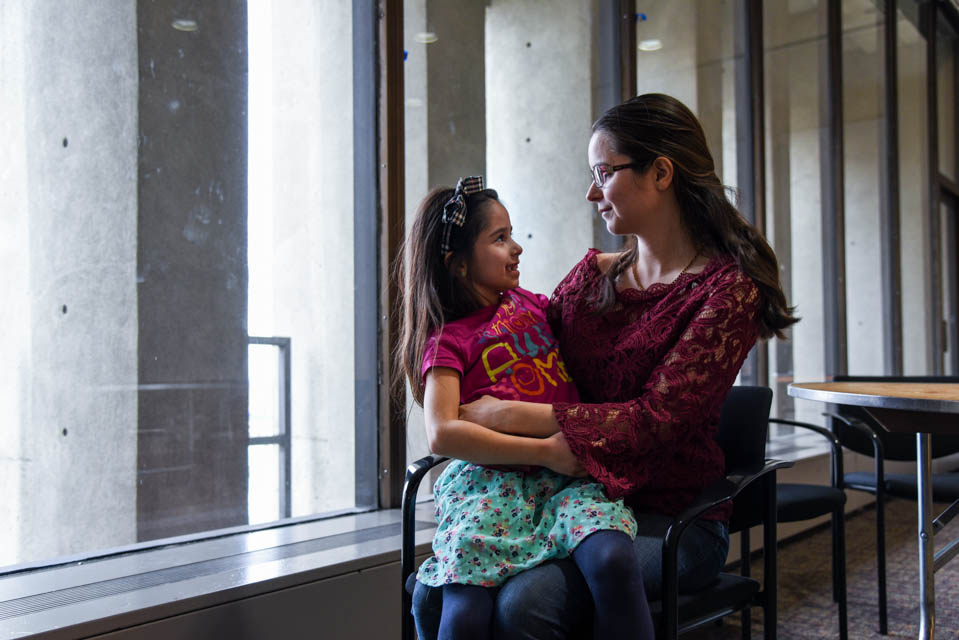
Natalie Tischler / Staff Photographer
Response to ‘An open letter to GS’s new dean’: Spectator can do better
“Without providing these kinds of opportunities, you are continuing to perpetuate the common error of paying lip service to the General Studies community. We appreciate your positive sentiments, but the students of General Studies would much rather have your collaboration. Please bring back the editorial board and do better to recruit students from the School of General Studies.”
Gilbert Cruz Garisbo Jr. graduated from the School of General Studies in 2015 with a bachelor’s degree in biochemistry. He was a member of Spectator’s editorial board during the academic year of 2014-15.
Columbia should provide childcare for undergraduates
“For student-parents, their children’s well-being and future is immediately dependent on their success. What could be more motivating than that? Don’t parents deserve a chance at a great education? GS provides an amazing opportunity, but college is still inaccessible to many prospective students with children; simply accepting our applications is not enough.”
Julia Hewitt is a second-year GS student and the mother of a seven-year-old.
Taking inclusive education to the next level: Online courses for GS
“Columbia and GS have sought to reach out to the non-elites of society—myself included—to provide us with an elite education. As part of the nontraditional student body, I know there are some of us who start this journey but are not able to finish it. Not necessarily because we do not have the will, the strength, the heart, or the intelligence, but because life can bring complexities that force us out of our programs. I believe that we can make the support system even stronger for nontraditional students at Columbia by incorporating accredited online classes into our programs so that more of us can complete our degrees.”
Alvaro Gonzalez Rubio is a junior in the School of General Studies majoring in mathematics.
The struggle for a union continues
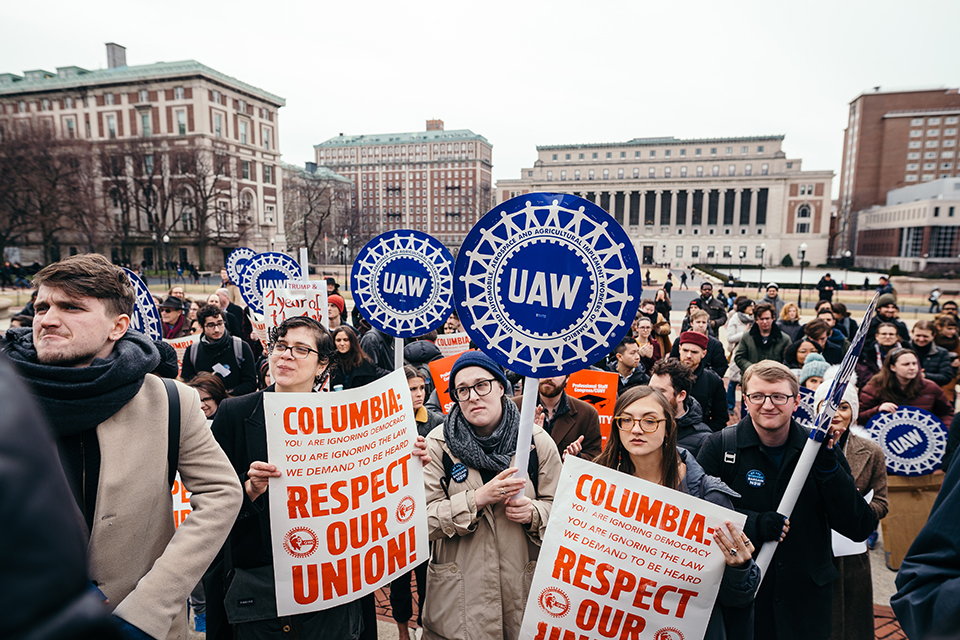
Jaime Danies / Senior Staff Photographer
The ugly history behind the administration’s anti-union campaign
“The ‘outside agitators’ story imagines a community unified around a common interest until a third party sneaks in to spoil things, like a snake in the garden. Yet the successful unionization campaign itself showed that that story was untrue; regardless of what administrators believe, the reasons we had for forming this union were our own. For example, during that campaign we argued that graduate students’ interest in a workplace free of sexual harassment could easily come into conflict with the University’s interest in protecting powerful employees.”
Rob Goodman is a doctoral candidate in the department of political science.
Letter to the editor: Yes, the grad student strike is “worth it for everyone”
“Graduate workers want to teach students, conduct their research, and facilitate academic inquiry on campus. Collective bargaining would provide them with recourse to begin to address pressing workplace issues such as low and late pay, inadequate benefits, a lack of clear workload expectations, alleged sexual harassment and discrimination, and an array of other issues.”
Student-Worker Solidarity has been organizing students to fight for economic justice and workers’ rights at Barnard and Columbia since 2012. If you’re interested in getting involved, reach out to studentworkersolidarity@gmail.com and check out their Facebook page.
Why I’m joining over 140 Columbia faculty in support of a graduate workers’ union
“When we, as faculty, support unionization for graduate student workers, we are protecting the dignity of work and the agency and well-being of all our students and of our present and future colleagues. We ask that the University do the same by following the law and beginning the bargaining process now.”
Marianne Hirsch is the William Peterfield Trent professor of English and comparative literature at Columbia and a professor in the Institute for Research on Women, Gender, and Sexuality.
A new activism for 2018
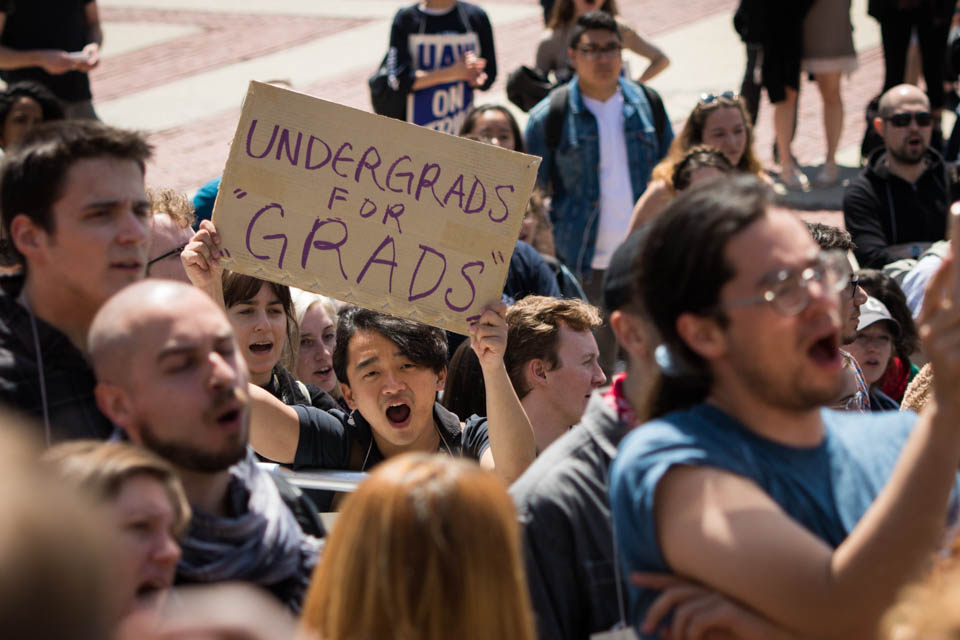
Katherine Gerberich / Senior Staff Photographer
Choosing to be involved when you’ve always been silent
“Suddenly that part of the alumni base is listening. More than listening, though, people are actually threatening to pull funding from the school and putting together efforts to organize against the student vote… Where were those people when communities made up of people of color, of trans people, of survivors of sexual violence were literally screaming out and asking for their help? Where were they when we were asking for alumni support? They were certainly not threatening to pull funding then.”
Dylan Kapit is a Barnard College graduate from the class of 2016. During their four years at Barnard, Dylan was heavily involved in advocating for the rights of trans students on campus.
Is this your campus activism?
“There exists at Columbia a faux-liberal atmosphere of commodified activism, one in which being ‘woke’ can gain you social status. In this way, many students deem themselves activists through hollow conversations, social media posts, and boisterous tweets surrounding current political issues.”
Nigel Telmanis a first-year in SEAS planning to major in mechanical engineering. While he spends too much time thinking about fictional pieces of media, Nigel also spends his free time playing bass for and managing the social media presence of hip-hop/R&B band Soul for Youth, rehearsing with the Columbia Big Band, and eating copious amounts of halal truck food.
Undergraduates, join the picket line
“Fellow undergrads, I’m not trying to convince you to camp outside the provost’s office or chant into a megaphone or even to bring coffee to the picket line—I’m trying to tell you that you have power to shape this University.”
XingJian Li is a Columbia College junior majoring in anthropology. She is studying abroad at SOAS, University of London for her junior spring.
The SGA Referendum Debate
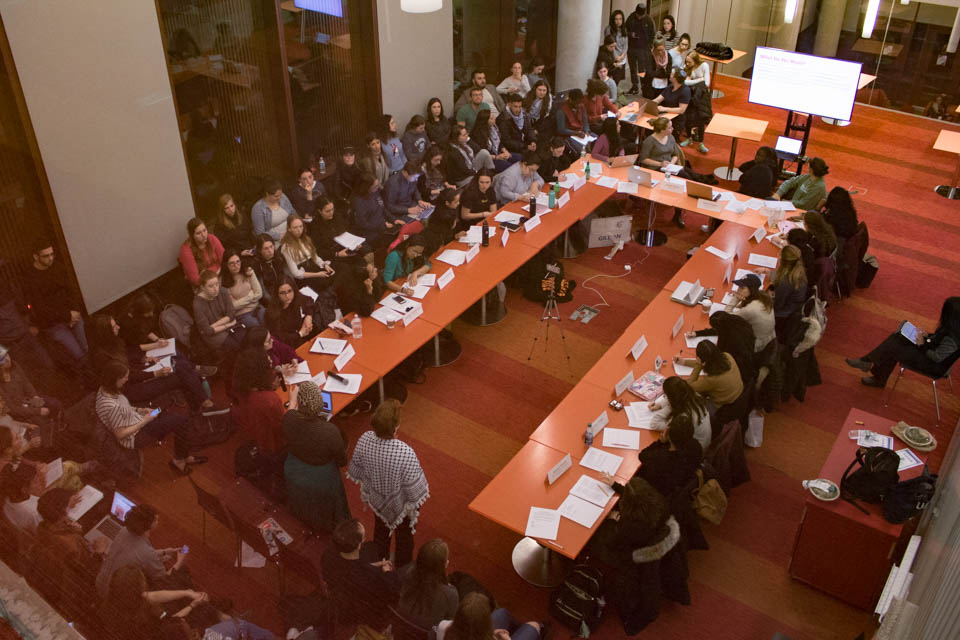
Katherine Gerberich / Senior Staff Photographer
Bold, beautiful, BDS: The moral case for saying “Yes to Divest”
“Yes, divestment at Barnard is a divisive issue, and yes, BDS at Barnard makes people uncomfortable....It is divisive precisely because it poses a simple—and yes, it is that simple—question: if you stand against injustice, will you stand with Palestine?”
Columbia University Apartheid Divest is a coalition between Students for Justice in Palestine and Jewish Voice for Peace.
Reject BDS and keep Barnard an inclusive environment
“BDS is a one-sided, misleading movement that does not delve deep enough into the complexities of this incredibly nuanced conflict. Its leaders advocate not for peace, compromise, or a two-state solution, but for division and the destruction of the only Jewish state.”
Morgan Raum is a junior in Barnard College studying political science and Judaic studies. She has a custom sneakers business and eats a lot of pasta and Thai food. You can follow her poppin’ food Instagram @tooomuchfoood. Lindsay Chevlin is a sophomore in Barnard College studying biology on the pre-med track. She expresses her competitive and athletic spirit by playing on the Columbia women’s rugby team.
Democracy and divestment: an argument for referendums
“We want to be honest and direct: There are some students and alumni of Barnard, and many strangers to our campus, who do not like that SGA chose to hold a referendum, who take issue with its phrasing, with its process, and with what it represents. But our primary responsibility as SGA is to represent the student body, and we are better able to do so now that we know the votes of the 1,153 Barnard students who participated in the referendum. We believe in the power of referendums, and think that they are the best tool for student governments to transparently represent the interests of their constituents.”
Angela Beam is a Barnard senior and the president of SGA. Alicia Simba is a Barnard junior and the SGA vice president of policy. Evelyn McCorkle is a Barnard senior and the SGA vice president of finance. Aku Acquaye is a Barnard senior and the SGA vice president of campus life. Rhea Nagpal is a Barnard junior and the SGA vice president of communications.
A candid response to President Beilock’s letter
“A common misconception is that supporting the referendum automatically makes one ‘pro-Palestine’ or ‘anti-Israel.’ This is not the case. Supporting the equal rights of human beings means denouncing the actions of an oppressor, not the oppressor itself.”
Janine Nassar is a first-year at Barnard studying human rights and political science and is interested in anything related to politics and social justice.

